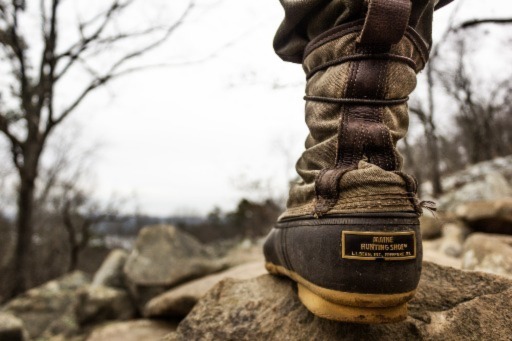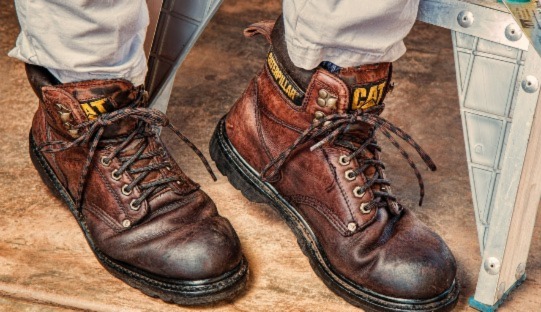Smelly boots are never a fun topic of conversation. However, if you are a hiker or outdoor enthusiast, you work in boots, or you have sweaty feet, sooner or later the issue is bound to come up. Whether you’ve been on a long hike or had a long day at work and your boots are ripe with sweat, or you’ve just been slogging through the rain, eventually your boots are going to start to smell.
You’re probably wondering how you get rid of that odor, or better yet, wondering how to prevent smelly boots in the first place. Here’s all the information you need to kick smelly boot odor for good!

What Causes Smelly Boots?
There are a few different things that can cause smelly boots, but the main culprit is bacteria. Foot sweat, like any sweat, is the perfect breeding ground for odor causing bacteria.
Even if your boots just get wet with water or other liquid, the moisture will also create an ideal environment for bacteria to grow, which will make your boots even smellier. Basically, anything that can cause or hold moisture has the potential to lead to the growth of odor causing bacteria.
Waterproofing One of the most popular and often necessary features of footwear is one of the leading causes of smelly boots. Waterproofing footwear is meant to keep water out obviously, but the same magic that keeps water out, also keeps moisture in.
Sweaty feet lead to sweaty socks which lead to sweat soaked boot interiors. Bacteria looooove sweaty boots and bacteria stinks.
Thick Insoles Thick insoles can cause your feet to sweat due to hindering any cooling features your boots may offer. Or by just being thick, thus causing a layer of insulation to be added to your footwear making your feet warmer.
Leather Leather is a pretty breathable material when it comes to footwear. But even with less foot sweat and moisture build up, leather boots can still become smelly.
The age of your leather boots and how well you’ve cared for them play a big role in whether or not boots become stinky. In some cases, the leather on your boots can start to rot, which will produce an unpleasant odor.
Did you know it’s not uncommon for old leather boots to have the faint odor of cat urine? It’s due to a polyurethane component of the soles breaking down.
Thick Socks The extra material traps sweat and bacteria, which can create an unpleasant smell.
How to Prevent Smelly Boots
To prevent your boots from smelling bad, it’s important to keep them clean and dry. You should also try to air them out as often as possible.

Wear non-cotton socks Cotton holds moisture and that’s never good. Socks made from natural materials like bamboo or merino wool wick moisture away and hinders bacteria growth.
Merino wool also has a unique feature. It absorbs the odor caused by bacteria that does happen to grow, preventing the odor from being detectable. Merino wool is kind of magic when it comes to it’s ability to prevent odors.
Let your boots dry completely (boot dryer) You want to get rid of any moisture in your boots as quickly as you can. As soon as you take off sweaty or wet boots, you should start drying them.
If just setting them out, fully opened, doesn’t do the job, get creative. Set them in front of an air duct or treat yourself to a boot dryer like this PEET.
It’s quiet, easy to use, and safe to use every day.
Alternate pairs of boots If your boots just won’t dry fully overnight or if you want to make sure they’re extra dry, try switching between two or more pairs.
Store your boots properly Throwing your boots into a pile isn’t going to do anything good for them. Standing them upright and opening them fully so they can breathe will help dry them up. For long term storage, stuffing them with newspaper and storing them fully opened in a tote will do the same.
Take care of your feet Putting your boots on with already dirty or feet that have not been washed after sweating is asking for smelly trouble.
With unwashed feet, you’re introducing bacteria to the boot before you even start sweating. As soon as your feet start to sweat, that bacteria are going to go wild and multiply at astounding rates, creating that smell we’re working so hard to get rid of.
Try antimicrobial inserts/insoles
These insoles are supposed to inhibit bacteria growth which can help cut down on smell, if not help stop it completely. You can also wear antimicrobial insoles in combination with the socks we talked about earlier to help even more.
Be sure to pull your insole out when you air dry your boots!
Superfeet make incredible insoles for all types of needs. I use the Trailblazer insoles for hiking. Many of their insoles have an antimicrobial or other odor reducing coating. These are the comfort insoles for men and women.
How to Get Rid of Odor in Boots
Use baking soda
How long does it take baking soda to deodorize shoes? Arm and Hammer says a few hours, but overnight is best, but that extra smelly boots may need a whole 24 hours.
Try dryer sheets Stuffing dryer sheets into your smelly boots will work kind of like baking soda. It’ll absorb some moisture and odor and leave behind a more pleasant scent.
Use some talcum or baby powder Also works like baking soda to a lesser degree. It’ll absorb moisture but I find the odor elimination part to be lacking with this powder.
Use tea bags A popular option is making tea and then putting the wrung-out tea bags in your boots to help absorb odor.
I haven’t personally tried this method and I’m a little leery too. All I can think is the moisture from the tea bag adding to the moisture in the boot, but so many people swear by this that I’m going to list it anyway.
Wash your insoles If your boots really smell, removing your insoles and washing them gently with soap and water may help tremendously. Make sure you check your care instructions if you still have them before submerging them in water.
Wash your boots Same as with the insoles, washing your boots may be a drastic option you need to take. It’s kind of a pain to wash footwear, but it may be necessary. When washing my shoes, I’ve always had decent luck with putting them in a pillowcase and tossing them in the washer. This probably isn’t great for boots with waterproof coating or steel toes.
Enzyme cleaner that eats bacteria Follow the directions on the bottle to rid your boots of the bacteria causing your smelly boots
Final Thoughts on Smelly Boots
Now that you know some of the main causes of smelly boots, as well as some preventative measures and ways to fix them, you can hopefully avoid this issue in the future.
If your boots are already stinky, don’t despair – there are several things you can do to fix the problem. Ultimately, the best way to avoid smelly boots is to take care of them and keep them clean.
Do you have any other tips for preventing or fixing smelly boots? Let us know in the comments!
Frequently Asked Questions About Smelly Boots
Can I put my smelly boots in the washing machine?
Generally, the answer to this is yes, but there are a few buts. Steel toe boots shouldn’t be put in the washing machine because they can damage the machine when getting spun around in it.
Boots with waterproofing coatings may become damaged in the wash, though you can take preventative steps to prevent this. It’s best to ask the manufacturer the best way to wash your particular pair of smelly boots.
Will putting my smelly boots in the freezer kill the smell?
It’s very possible. Cold kills bacteria so putting your boots in a plastic bag and freezing them overnight could work. The colder the freezer and the longer you leave your boots inside the better the outcome will be.
Why do my shoes stink up so fast?
Bacteria collect in your shoes, socks, and on your skin. The bacteria multiply, and before you know it, you’re dealing with a full-blown stink attack. To avoid this, be sure to follow the advice up above.